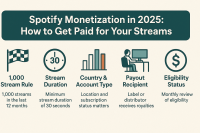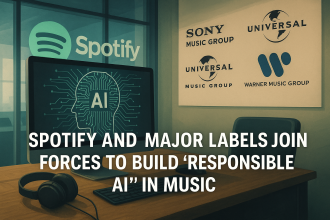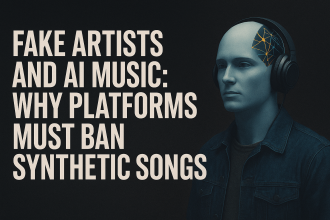Artificial intelligence is reshaping the music industry — but not necessarily for the better. A growing flood of AI-generated songs is now overwhelming major streaming platforms, raising serious concerns about copyright, royalties, and artistic authenticity. What began as a creative experiment has turned into a disruptive wave that challenges the very definition of music ownership.

A Flood of AI-Generated Music
In recent months, experts estimate that up to 15% of all new uploads on major streaming services are AI-generated. Some of these tracks are experimental, created by artists exploring new technologies. But a large portion originates from anonymous uploaders using automated tools to flood platforms with low-quality or cloned material.
These AI systems can now replicate voices, production styles, and songwriting patterns with uncanny precision — even mimicking the tone of famous artists. This has led to a surge of so-called “ghost copies”: songs engineered to exploit algorithmic recommendations, keyword trends, and fan searches, all for monetization.
While platforms have started removing mass-uploaded AI tracks, the problem is growing faster than moderation systems can handle. The result? Thousands of synthetic songs slip through every week, diluting playlists and competing for royalties meant for real musicians.
The Platforms React
Streaming companies are beginning to fight back. Several have developed internal tools to detect AI-generated content, using waveform analysis and metadata tracking to flag suspicious uploads. Some platforms have even introduced “AI-generated” tags to make the source of each song transparent to listeners.
This approach aims to restore trust by ensuring users know whether they’re listening to a human artist, a hybrid composition, or a fully machine-produced track. Moreover, some services are redefining their royalty distribution systems, excluding entirely AI-made songs from monetization in order to protect human creators.
This initiative reflects a growing understanding that the integrity of digital music depends on transparency — and that AI’s place in the ecosystem must be clearly defined.
The Ethical and Legal Grey Zone
The rise of AI-generated music has opened a legal Pandora’s box. Who owns the copyright of an AI-composed track? Can a machine legally “sample” a voice or emulate a sound that belongs to a living artist?
There’s currently no universal framework to answer these questions. Platforms act on a case-by-case basis, often relying on user reports or takedown requests. Yet this reactive model is unsustainable. As AI models continue to evolve, the risk of large-scale rights violations — and the loss of income for legitimate artists — becomes increasingly severe.
Ethically, the debate goes beyond ownership. Many musicians argue that AI-produced songs lack the emotional depth and human imperfection that define real artistry. Others see AI as a legitimate creative tool — but only when used transparently and collaboratively.
How It Affects Listeners
For most users, the shift might feel invisible — but it’s already changing what you hear. Algorithms trained to maximize engagement are just as happy to recommend AI music as human-made songs. Over time, your playlists could fill with machine-generated content optimized to mimic your taste, without you even realizing it.
That’s why some platforms are preparing to introduce “Certified Human Artist” or “AI-Assisted Track” tags, ensuring clarity for listeners. These labels could soon become a standard, helping fans support authentic creators and discover new voices without falling into algorithmic traps.
A Necessary Evolution
Artificial intelligence isn’t going away — and neither is music. The challenge for the industry now is to balance innovation with authenticity. AI can be an incredible creative ally when used responsibly, offering tools for composition, mixing, and even vocal design. But without transparency and regulation, it risks overwhelming the very ecosystem it was meant to enhance.
The future of streaming will likely depend on three key principles:
- Transparency — letting listeners know when a track is AI-generated or assisted.
- Fairness — ensuring royalties flow to real creators, not automated uploaders.
- Integrity — preserving the human emotion that gives music its soul.
![]()

















